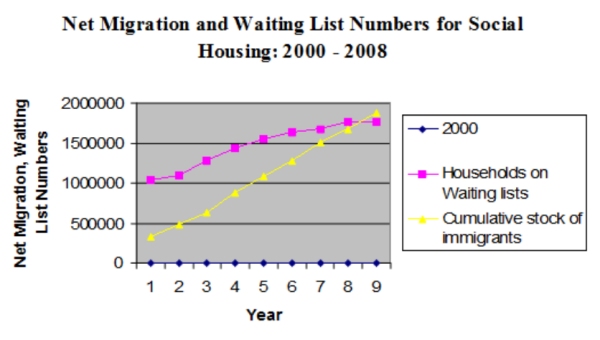Migration Watch claims migrants are driving social housing demand
Migration Watch has published a new claim that meeting the social housing needs of new immigrants will cost the tax payer £1 billion a year for the next 25 years. It bases its assessment on the fact that migration is currently expected to lead to the formation of 83,000 new households each year, out of a projected total of 232,000 new households. These are official figures, but they need to be treated with great caution: population projections are revised regularly and do not take account of the economic situation, which might well lead to a fall in net migration over the next few years.
While the 83,000 households (if the projection is correct) would add to housing demand, so would the 149,000 households due to form from natural population growth. The link between this overall demand and the number of homes that are built is purely theoretical: many of these households will share, many won’t qualify for social housing for many years, or be able to afford to buy. In any event, for many years now the number of new houses built has not kept pace with household formation.
The fact is that the government currently plans to build 150,000 social homes over the next five years and the budgets to do that are already fixed. Much of the money has to come from social landlords’ own resources, which means rents will go up. Grants for new social housing will total only £4.5bn for the four years 2011-2015. It is absurd to say that social housing for migrants will cost the taxpayer £1bn per year as this would be almost the total budget.
Few if any new migrants will qualify to get these homes: the percentage of new social housing lettings going to foreign nationals in any one year is only 7%, and the vast majority of these are likely to be people who have lived in the UK for many years, and have had time to get settled immigration status, to have families and to qualify through waiting lists. As a new briefing from Oxford’s Migration Observatory points out, 75% of newly-arrived migrants go into the private rented sector.
The Migration Watch research paper also tries to link social housing and migration by putting the growth in waiting lists and in net migration on the same graph (see below). This compares chalk and cheese: only a very small percentage of the new migrants shown would have been eligible to go on waiting lists, and an even smaller proportion would have actually put their names down, for a variety of reasons. An important one is that much of the growth shown is from the new EU countries, most of whose nationals did not initially qualify for social housing anyway.

The press release also says: ‘non-EU migrants were more likely to live in social housing than the UK born’. It then quotes selectively for different groups of non-UK nationals. Over the long-term, the use of social housing by the foreign born population is similar to the UK born – some groups like those quoted use it more, others such as Indian or Pakistani people use it much less. Migration Watch tells only half the story. It would be equally true to say that the proportion of Kenyan people who are homeowners is higher than that of UK born people, but that does not mean most people trying to buy houses are Kenyans.
Original post and comments: Migration Pulse